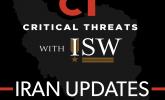February 2, 2023 - ISW PressIraq. The Islamic State in Iraq and al Sham likely made a strategic choice to decrease its attacks in some areas of Iraq to enable their use as transit zones. ISIS continues to use Ninewa province in northwestern Iraq to move supplies and personnel to support its attack cells in eastern Iraq. Iraq’s government is attempting to limit ISIS movements, though Ninewa’s geographic and demographic features challenge this effort. ISIS likely retains some access to rural Arab communities due to Yazidi-Arab tensions stemming from the aftermath of ISIS atrocities and subsequent retribution attacks in the 2014–17 period.
Somalia. The Islamic State is leveraging networks across multiple continents to sustain both new and established affiliates. A US military raid in northern Somalia killed a key ISIS facilitator in northern Somalia. This facilitator oversaw a sprawling financial and logistical support network from Somalia that coordinated trainers and funding to Islamic State affiliates in Afghanistan, the Democratic Republic of the Congo, and Mozambique. His death may temporarily disrupt these activities.
Afghanistan-Pakistan. The Tehrik-e-Taliban Pakistan (TTP) significantly escalated its attack campaign against the Pakistani state with a major suicide bombing targeting police in northwestern Pakistan on January 30. Conflicting TTP responses to the attack could demonstrate internal TTP divisions over strategy and ideology. These divisions, as well as tensions between the Afghan Taliban and the TTP faction that conducted the attack, could lead this faction to ally itself with the Islamic State’s branch in the region. Afghan Taliban support for the TTP will continue to strain the Taliban’s relationship with Pakistan and increases the likelihood of Pakistani military action against TTP havens in Afghanistan.








